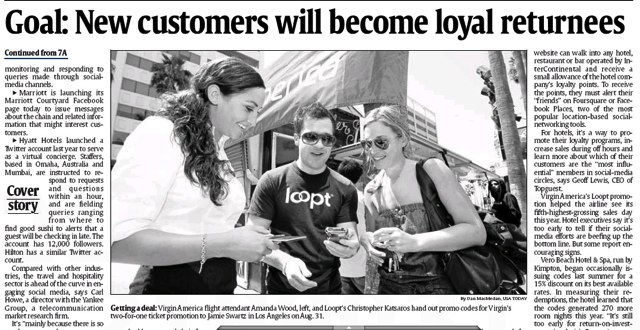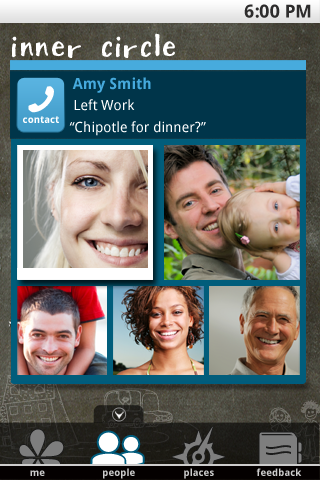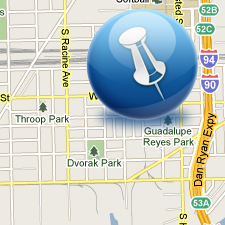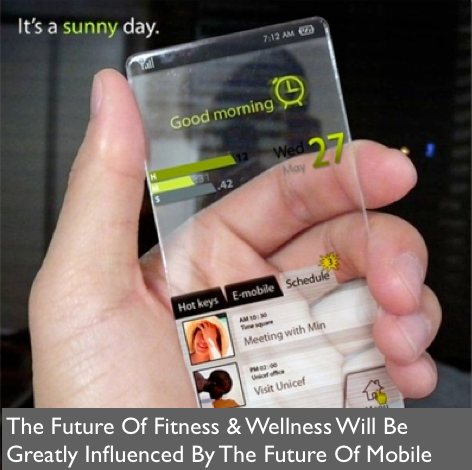 Location-based mobile apps and services have been around a while, but with the explosion of smart mobile devices 2011 is going to be THE breakout year. Big retail brands are starting to experiment with location-based campaigns and checkin rewards programs and the fitness industry will eventually follow. It does not seem, however, many in traditional fitness or wellness have attempted to explore this emerging solution, yet. I believe that will change and soon.
Location-based mobile apps and services have been around a while, but with the explosion of smart mobile devices 2011 is going to be THE breakout year. Big retail brands are starting to experiment with location-based campaigns and checkin rewards programs and the fitness industry will eventually follow. It does not seem, however, many in traditional fitness or wellness have attempted to explore this emerging solution, yet. I believe that will change and soon.
An article by Jennifer Van Grove titled the Top 5 Location Based Services Mashable Awards published in October listed the top five location-based services in a list that includes predictable names and lesser known upstarts.
Her list below serves as a countdown beginning at the fifth most significant service and arriving at her top pick for location-based innovation. Thanks Jennifer for a great assessment and article on the topic - the full article is available here.
Has your fitness business experimented with location based applications and services ? What is working or not ? What do you think about this in the fitness or wellness space ? Contact me, Bryan O’Rourke, and share your experiences or thoughts on location based campaigns and reward programs in the fitness industry as it relates to these new platforms.
 5. Yelp for Mobile
5. Yelp for Mobile
Yelp is the original location-based service that redefined “local” for small businesses and their online customers. In 2010, Yelp continues to remain relevant with mobile applications that reach BlackBerry, iPhone, Android, PalmPre, Windows Phone 7, and most other smartphone users.
Yelp Mobile may not be the trendiest location-based service, but it’s arguably the most practical. Stats from September of this year show that Yelp Mobile generated 3 million unique visitors for the month and more than 1 million people created point-to-point directions to a local business. We’re not partial, however, to Yelp’s also-ran checkin features. The startup should stick to what it does best — convenient and replete location-based business listings and reviews.
4. Neer
Newcomer Neer brings ingenious innovation around personal and private automatic location-sharing to Android device owners. The startup launched earlier this year after incubating inside Qualcomm Services Labs. Creator Ian Heidt describes Neer as occupying “the middle ground between Foursquare () and Google Latitude.” That’s a technologically sound description, but we see Neer as the most practical application of location for actual real-world scenarios — like knowing if your kids made it to school.
Neer doesn’t bother with checkins, badges or other kitschy game mechanics. The service is designed so that you know where your loved ones and friends are, and vice versa. Since users have complete control over who can see their whereabouts — in place names, not physical addresses — there’s little to worry about on the privacy front. The application is also designed with the average user in mind, meaning the user interface is both slick and uncomplicated. As the space matures, location-based services will take inspiration from Neer and evolve past the pure novelty of checkins and location-sharing.
 3. Loopt
3. Loopt
Once the location app on everyone’s lips, Loopt has lost some of its luster to more buzz-worthy incumbents. But, Loopt continues to innovate around location and just last week updated its iPhone app to include deep integration with Facebook Places.
Loopt’s application is also the most aggressive of the big name players when it comes to automatic location-sharing, meaning it supports background location and proximity alerts for nearby friends. There’s also the branded-rewards Loopt Star application, which has already demonstrated that it can push users to take action and drive them to their partners’ physical locations. With this formula, there’s certainly real revenue potential beyond just advertising.
2. SCVNGR
In just a few months time, SCVNGR has gone from an obscure mobile app for iPhone and Android to a formidable player in the location space with upward of 500,000 users. Now the Google ()-backed startup is said to be making millions thanks to more than 1,000 paying enterprise clients, which include the likes of Sony and Warner Bros. As a service, SCVNGR differentiates itself with point-based challenges on top of checkins and interesting partners such as The Boston Globe, Minnesota Vikings, AT&T and the Smithsonian museums.
Just recently, the team redesigned the mobile apps to better surface user activity. Sophisticated Facebook Places integration also plays a significant role in the application experience and on the Facebook Place Pages for business owners. Perhaps more interesting than the service itself is the 21-year-old whiz kid at the helm (pictured left in the photo above). Princeton dropout and serial entrepreneur Seth Priebatsch is barely old enough to drink, but this youngster is one huge overachiever with a grandiose vision for SCVNGR and the passion to make it happen.
1. Foursquare
Despite the emergence of Facebook Places months ago, Foursquare is still very much alive with its 4 million registered users. We think it’s safe to say that this startup continues to thrive because it’s more about people and places than it is about location.
We could rattle off Foursquare’s numerous partnerships, highlight its quirky badges or talk about its battles for mayorship, but what puts Foursquare atop our list is the fact that the service has created a phenomena around checkins, badges and rewards that’s been copied and adapted by countless other web and mobile services all trying to emulate Foursquare’s magic.
Foursquare’s recent restructuring of its iPhone and Android apps to highlight tips and to-dos point to a not-so-distant future when, co-founder Dennis Crowley explained, Foursquare will “reinvent what happens after the checkin.”
In many ways, Foursquare already reinvents what happens both before and after the checkin. Just look at how Jimmy Choo employed a pair of trainers to inspire a three-week frantic offline shoe hunt in London — with shoe sales jumping 30% around the time of the campaign — as proof of the concept. It’s the one campaign that Tristan Walker, Foursquare’s director of business development, speaks most highly of, even though the startup didn’t directly participate in the sale.
 Dan Frommer's recent post, "The Future Of Mobile Is The Future Of Everything" quoted Matt Galligan, co-founder of SimpleGeo, a location services company. When asked about the future of mobile Matt said, "In my opinion, the 'future of mobile' is the 'future of everything'.", hence the article's title. Matt's right and in the world of fitness and health he's even more right.
Dan Frommer's recent post, "The Future Of Mobile Is The Future Of Everything" quoted Matt Galligan, co-founder of SimpleGeo, a location services company. When asked about the future of mobile Matt said, "In my opinion, the 'future of mobile' is the 'future of everything'.", hence the article's title. Matt's right and in the world of fitness and health he's even more right.








